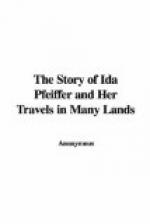The Brazils suffer, too, from a plague of insects,—from mosquitoes, ants, baraten, and sand-fleas; against the attacks of which the traveller finds it difficult to defend himself. The ants often appear in trains of immeasurable length, and pursue their march over every obstacle that stands in the way. Madame Pfeiffer, during her residence at a friend’s house, beheld the advance of a swarm of this description. It was really interesting to see what a regular line they formed; nothing could make them deviate from the direction on which they had first determined. Madame Geiger, her friend, told her she was awakened one night by a terrible itching: she sprang out of bed immediately, and lo, a swarm of ants were passing over it! There is no remedy for the infliction, except to wait, with as much patience as one can muster, for the end of the procession, which frequently lasts four to six hours. It is possible, to some extent, to protect provisions against their attacks, by placing the legs of the tables in basins filled with water. Clothes and linen are enclosed in tightly-fitting tin canisters.
The worst plague of all, however, are the sand-fleas, which attach themselves to one’s toes, underneath the nail, or sometimes to the soles of the feet. When a person feels an irritation in these parts, he must immediately look at the place; and if he discern a tiny black point, surrounded by a small white ring, the former is the chigoe, or sand-flea, and the latter the eggs which it has deposited in the flesh. The first thing to be done is to loosen the skin all round as far as the white skin is visible; the whole deposit is then extracted, and a little snuff strewn in the empty space. The blacks perform this operation with considerable skill.
Rich as the Brazils are in natural productions, they are wanting in many articles which Europeans regard as of the first importance. There are sugar and coffee, it is true; but no corn, no potatoes, and none of our delightful varieties of fruit. The flour of manioc, obtained from the cassava plant, which forms a staple portion of almost every dish, supplies the place of bread, but is far from being so nutritious and strengthening; while the different kinds of sweet-tasting roots are far inferior in value to our potato. The only fruit which Madame Pfeiffer thought really excellent, were the oranges, bananas, and mangoes. The pine-apples are neither very sweet nor very fragrant. And with regard to two most important articles of consumption, the milk is very watery, and the meat very dry.
* * * * *
Our traveller, during her sojourn at Rio Janeiro, made many interesting excursions in the neighbourhood. One was directed to Petropolis, a colony founded by Germans in the heart of scenery of the most exquisite character. Accompanied by Count Berchthold, she sailed for Porto d’Estrella in one of the regular coasting barks. Their course carried them across a bay remarkable for its picturesque views. It lies calmly in the embrace of richly-wooded hills, and is studded with islands, like a silver shield with emerald bosses. Some of these islands are completely overgrown with palms, while others are masses of huge rock, with a carpet of green turf.




